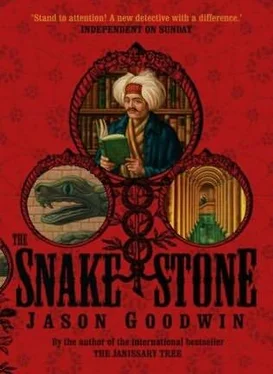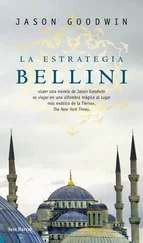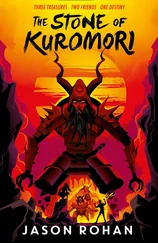Jason Goodwin - The snake stone
Здесь есть возможность читать онлайн «Jason Goodwin - The snake stone» весь текст электронной книги совершенно бесплатно (целиком полную версию без сокращений). В некоторых случаях можно слушать аудио, скачать через торрент в формате fb2 и присутствует краткое содержание. Жанр: Исторический детектив, на английском языке. Описание произведения, (предисловие) а так же отзывы посетителей доступны на портале библиотеки ЛибКат.
- Название:The snake stone
- Автор:
- Жанр:
- Год:неизвестен
- ISBN:нет данных
- Рейтинг книги:4 / 5. Голосов: 1
-
Избранное:Добавить в избранное
- Отзывы:
-
Ваша оценка:
- 80
- 1
- 2
- 3
- 4
- 5
The snake stone: краткое содержание, описание и аннотация
Предлагаем к чтению аннотацию, описание, краткое содержание или предисловие (зависит от того, что написал сам автор книги «The snake stone»). Если вы не нашли необходимую информацию о книге — напишите в комментариях, мы постараемся отыскать её.
The snake stone — читать онлайн бесплатно полную книгу (весь текст) целиком
Ниже представлен текст книги, разбитый по страницам. Система сохранения места последней прочитанной страницы, позволяет с удобством читать онлайн бесплатно книгу «The snake stone», без необходимости каждый раз заново искать на чём Вы остановились. Поставьте закладку, и сможете в любой момент перейти на страницу, на которой закончили чтение.
Интервал:
Закладка:
They wouldn’t need to say that he had killed Lefevre. All that mattered was the cloud of uncertainty-the dust raised by the French ambassador’s report. The shake of a head, a fluttering of hands, a frown: those would be enough to damn him.
Powerful friends would drop him in a blink. Not a matter of choice, but of survival. People who had depended on him-just the way Lefevre had done-would need a new protector.
At the back of Yashim’s mind lay the thought that Palewski had run him into a trap. He did not encourage the thought; but he allowed it to relieve him a little of the wretchedness he felt.
Yashim put his hand to his head. He’d been too slow: too slow to save a life, too slow to rescue his own reputation; now Palewski’s blundering had cost him his room for maneuver.
How long would the ambassador need to make his report? A few days, at most. A few days, then, was all he had. To find the killers, and to save himself.
31
The French ambassador didn’t care about evidence all that much. A man had been killed, a Frenchman of little account; it was his duty as magistrate to make a report to the proper authorities in Istanbul. Perhaps the Ottoman gentleman, Palewski’s friend, knew more than he said; perhaps he was even responsible. Pera was getting more dangerous every day: there it was. One should take more care.
So the ambassador did not pause to reflect, as Yashim did, that his summary had been out of step with the truth. Lefevre, the captain, and Yashim: all three had known in advance where Lefevre was to be found that night. But anyone able to examine the ship’s manifest would have known as well, and the boatmen on the caiques, who saw him leave.
Yashim settled into the bottom of a caique. The boatman shoved off with a flick of his long oar.
“Where to, efendi?”
“Fener Kapi,” Yashim said. The Fener landing stage. The boatman nodded: he was a Greek, and Greeks liked going to Fener.
For hundreds of years Fener had been the seat of the Orthodox Patriarchate, the soul of Greek Istanbul. In a city where many races and faiths mingled, the Patriarch was a link to the centuries before the Ottoman Conquest, when Constantinople stood at the hub of the Christian world. For a thousand years, decked in the insignia of the church, Byzantine emperors had borne themselves proudly as God’s anointed rulers on earth, greater than popes or patriarchs, wrapped in an unceasing round of prayer and ostentation-interrupted only by usurpation, betrayal, violent death, palace coups, murders, and the vicious political maneuvering favored by tyrants everywhere.
Worn steps led up to a battered door that had seen much since the last emperor of Byzantium vanished in his purple buskins as Ottoman troops swarmed across the walls of his desolate city. Behind that door lay the central piece in the elaborate mosaic of the Orthodox faith, which spread from the deserts of Mesopotamia and the roadsteads of the Aegean, to the mountains of the Balkans and along the basalt cliffs of the Black Sea; all that was really left of the might and glory of the second Rome, the city of Constantine and Justinian, all that had survived the battle of iconoclasts and iconodules, the treachery of the Latins and the warlike prowess of the Turks.
Yashim gazed at the great door, then stepped along the street to a smaller gateway, which for the last seventeen years had served as the main entrance to the Patriarchate. The great gate had been sealed as a mark of respect toward the Patriarch Bartholomew, hanged from its lintel by the sultan’s order during the Greek riots of 1821.
At the gate, he asked for the archimandrite.
Grigor was in his private office: a fat man with a big beard in a black surtout.
“Yashim-the angel!” Grigor opened his arms wide across a desk piled with packets and papers done up in purple ribbon.
The angel was Grigor’s little joke, not one that Yashim particularly shared. As Grigor had once explained, Byzantine iconography represented angels as eunuchs. Angels stood on the threshold between men and God; eunuchs, between men-and women. Both were intermediaries, dedicated to serve.
“You look well, Grigor,” Yashim said.
“I am fat and ugly, and you know it, Yashim. But we are, fortunately, all one in the sight of God.”
Many years ago, he and Yashim had worked for the same master, the Phanariot princely family of the Ypsilanti. Grigor, a couple of years older, had made a point of sneering at Yashim’s provincialism, sending him on fool’s errands, and tormenting him with salacious details of his conquests. It was the obscene stories, above all, which had caught Yashim on the raw.
One day Grigor had gone too far. Yashim had folded back his sleeves and they had fought together through kitchen and courtyard. “About time someone taught that little snot a lesson,” the head groom had said as he marched Yashim upstairs to face Ypsilanti.
But after that, they had understood each other. They had even become, in a way, friends. When the Patriarch was hanged and riots exploded in the streets, Yashim had helped Grigor to escape the city.
“You will take a coffee with us?” Grigor rang a bell. “The school is flourishing,” he added.
“I am glad.” There had been a difficulty, two years before, over plans to expand the Greek boys’ school, and Yashim had helped to smooth it over.
They talked for a few minutes, drinking their coffee, skirting around delicate subjects. Eventually the priest returned his empty cup to the saucer.
“It is good to see you. To talk again.”
Yashim took a breath. “You’ve heard the rumors about the sultan?”
Grigor leaned his chin into his beard. “He is very ill.”
“So I understand. It would be an old man who could remember the last time a sultan died this way. Selim was murdered at Topkapi.”
“And Mahmut was just a child. Of course. Now he has reigned for a long time.”
“Reigned, but not ruled. He was under the control of the Janissaries, his own army, for almost twenty years.”
Grigor frowned. “So he should not be held to account for what happened before he destroyed the Janissaries? The murder of the Patriarch Bartholomew cannot be laid at his door?”
Yashim decided to let this pass. “There’s a mood in the city I’ve never known before, Grigor. Look at the money. The sultan is slowly dying, and the people are afraid of the money. Its value is sinking every day.”
“I am a priest, not a banker.”
Yashim turned his head and gazed out of the window.
“I meant it as an example,” he said slowly. “In former times, the death of a sultan stopped the clocks. Only the son who could buy off the Janissaries, take control of the treasury, and win the backing of the holy men succeeded to his place.”
“A barbaric arrangement,” Grigor said.
Yashim pressed on. “When the Janissaries killed Selim, they took power before anyone could react. But Mahmut’s illness casts a shadow over Istanbul.”
Grigor sighed. “All those years ago, when you helped me get away from here, I wandered among the monasteries of Bulgaria. My life changed. And I came back. Do you know why?”
“To join the church,” Yashim said.
“To join the church,” Grigor echoed, with a nod. “Of course.” He paused. “I came back, Yashim efendi, because this is my city. We Greeks do not govern it, I admit. But it governs us. For me, this city is not a reminder of what we were. A city of art? Paff! The place where we triumphed for a millennium-over barbarians, over the pope in Rome, over all our enemies-until the last one?”
He pursed his lips, a thoughtful look on his face. “We do not seek battles. Our concern is with the spirit and the mystery of life. Who rules is of no consequence to us. We obeyed an emperor. We obey a sultan. This is the order ordained by God, in the material world, and the Redeemer instructed us to make our peace with that order. Render to Caesar what belongs to Caesar, and to God what belongs to God. This is the Bible.”
Читать дальшеИнтервал:
Закладка:
Похожие книги на «The snake stone»
Представляем Вашему вниманию похожие книги на «The snake stone» списком для выбора. Мы отобрали схожую по названию и смыслу литературу в надежде предоставить читателям больше вариантов отыскать новые, интересные, ещё непрочитанные произведения.
Обсуждение, отзывы о книге «The snake stone» и просто собственные мнения читателей. Оставьте ваши комментарии, напишите, что Вы думаете о произведении, его смысле или главных героях. Укажите что конкретно понравилось, а что нет, и почему Вы так считаете.












